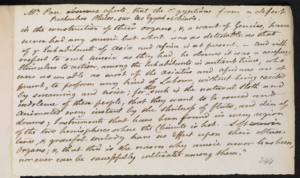Long's Notes on Music
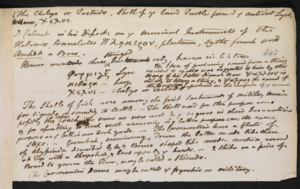
The Chelys or Testudo, shell of the land turtle formed the ancient lyre, χελυς.
D. Calmet in his Disert: on the Musical Instruments of the Hebews, translates πληκιξον, plectrum, by the French word archet a bow.
Homer mentions three stringed instruments only, known in his time
θσςμιδξ – lyre
κιθαξ – harp
χελυς – chelys or testudo
The idea of producing sound from a string ascribed to Apollo was suggested to him by the twang of his sister Diana’s bow. Ψαλλειν is strictly to twang a string, a ψαλμος the sound of the bow produced on the emission of the arrow.
The shells of fish were among the first instruments of military music for signals on sounding to battle.— The shell used for this purpose was possibly the large conch, the same as was used by the negroes in their insurrections and for assembling to work with(?) answering in the latter purpose case the same purpose(?) as the bell in our dock yards.—The Coromantins have a flute of stops.—Goombah, merriwang, drum the latter made like those of Abyssinia described by Mr. Bruce shaped like wooden mortain(?) around at top with a sheepskin, and beat upon by the hands.—2 strikes on a piece of board to govern the time, may be called a sticado.
The Coromantin dance may be called the pyrrhic or military.
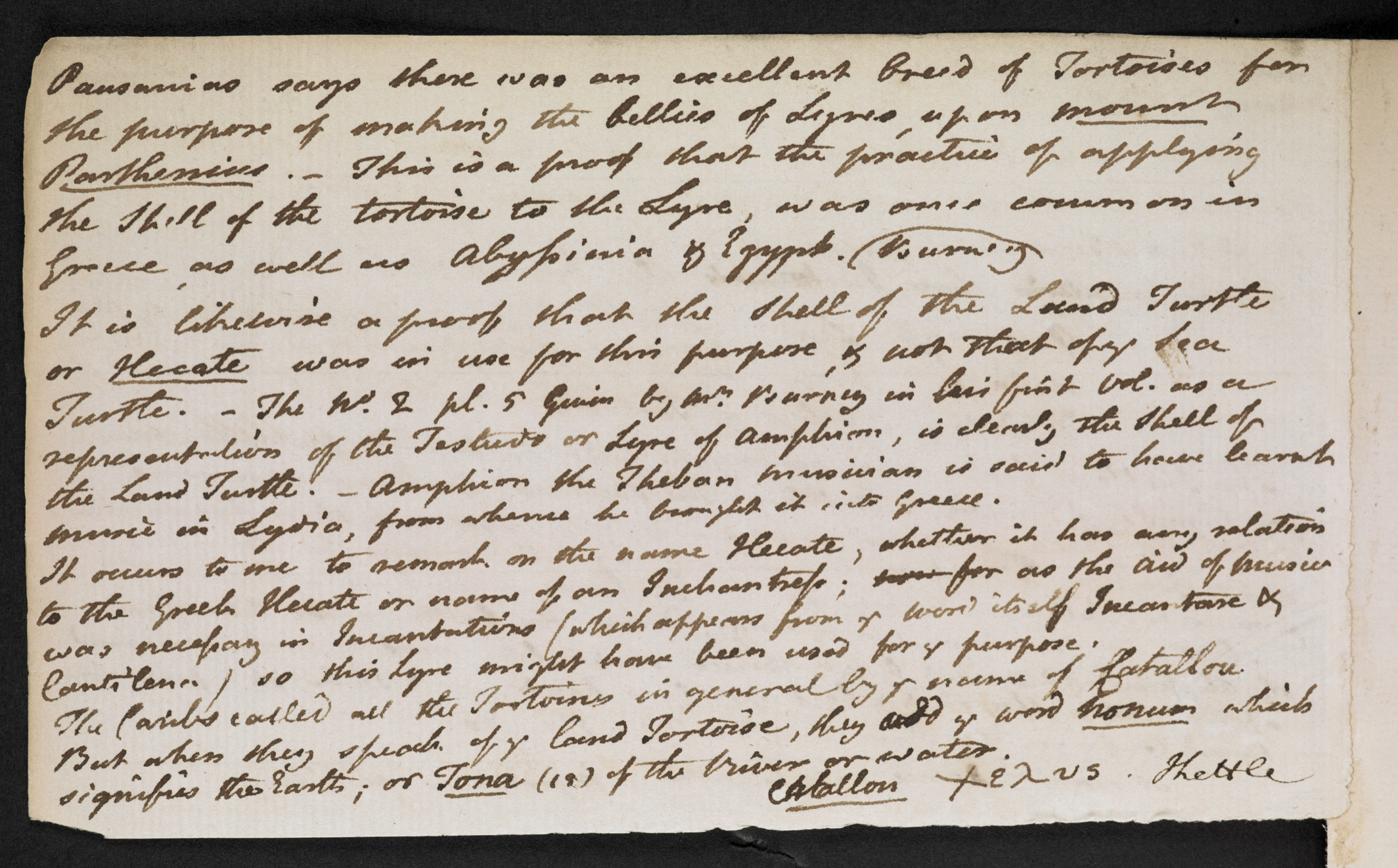
Pausanias says there was an excellent breed of tortoises for the purpose of making the bellies of lyres, upon Mount Parthenius.—This is a proof that the practice of applying the shell of the tortoise to the lyre, was once common in Greece, as well as Abyssinia and Egypt. Burney.It is likewise a proof that the shell of the land turtle or Hecate was in use for this purpose, and not that of the sea turtle.–-The No. 2 pl. 5 given by Mr. Burney in his first vol. as a representation of the Testudo or Lyre of Amphion, is clearly the shell of the land turtle. —Amphion the Theban musician is said to have learnt music in Lydia, from whence he brought it into Greece.
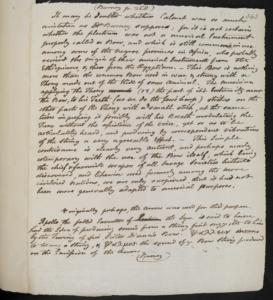
(Burney p. 268)
*originally perhaps, the arrow was used for this purpose. Apollo the fabled inventor of the lyre is said to have had the idea of producing sound from a string first suggested to him by the twang of his sister Diana’s bow. Ψαλλειν means to twang a string, and ψαλμος the sound of the bow string produced on the emission of the arrow.
Burney
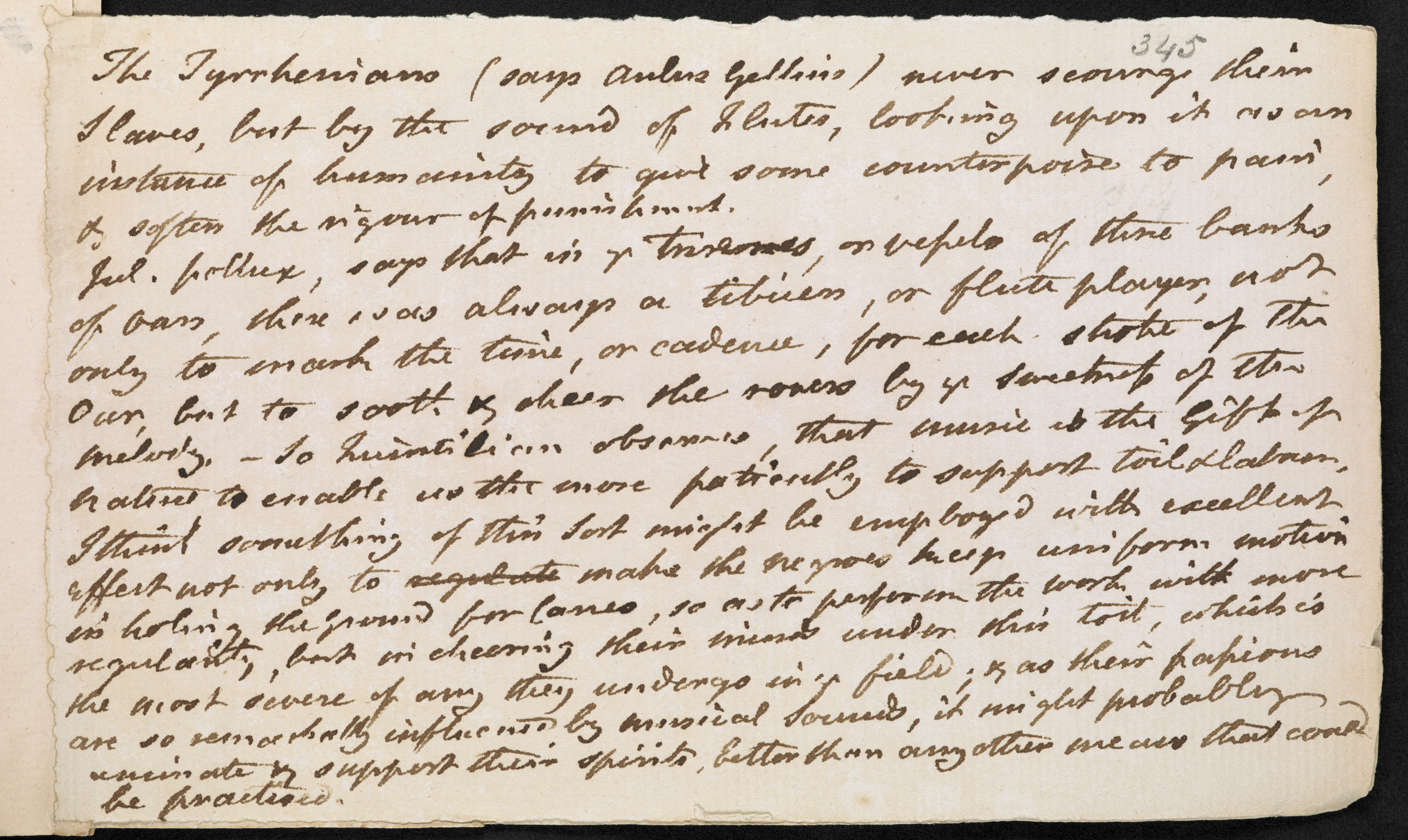
Jul. Pollux, says that in the triremes, or vessels of three banks of oars, there was always a tibicen, or flute player, not only to mark the time, or cadence, for each stroke of the oar, but to sooth and cheer the rowers by the sweetness of the melody. So Quintilian observes, that music is the gift of nature to enable us the more patiently to support toil and labor. I think something of this sort might be employed with excellent effect not only to regulate make the negroes keep uniform motion in holing the ground for canes, so as to perform the work with more regularity, but in cheering their minds under this toil, which is the most severe of any they undergo in the field; and as their passions are so remarkably influenced by musical sounds, it might probably rejuvenate and support their spirits, better than any other means that could be practiced.
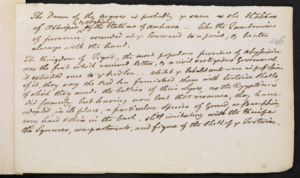
The drum of the negroes is probably the same as the Kâbâro of Ethiopia and Abyssinia and the Hârâmo of Amhara—like the tambourine of Provence, rounded at the lower end to a point, and beaten always with the hand.
The Kingdom of Tigrē, the most populous province of Abyssinia was the first which received letters, and a civil and religious government. It extended once to the Red Sea. Whilst the inhabitants were in possession of it, they say the Red Sea furnished them with tortoise shells, of which they made the bellies of their lyres, as the Egyptians did formerly. But having now lost that resource, they have adopted, in its place, a particular species of gourd, or pumpkin, very hard and thin in the bark, still imitating with the knife the squares, compartments, and figure of the shell of the tortoise.

